Curriculum
The International Baccalaureate – The PYP offers an inquiry-based, transdisciplinary curriculum framework that builds conceptual understanding. It is a student-centered approach to education for children aged 3-12. Nassa (Nasional Satu) School has adopted this program because its focus is to develop children who are active, caring about their surroundings, and instilling a love for learning. Students are taught to actively participate in the teaching and learning process.
The PYP framework consists of five essentials: knowledge, conceptual understandings, skills, the attributes of the IB Learner profile, and Action. All these essentials are taught to students through active learning participation and using relevant topics taught in a transdisciplinary manner across six areas of knowledge: Language, Social Studies, Mathematics, Arts, Science, and Personal, Social, and Physical Education.
Website Resmi: IB PYP
CURRICULUM FRAMEWORK
The framework of PYP curriculum emphasizes the central principle of agency, which underpins the three pillars of school life:
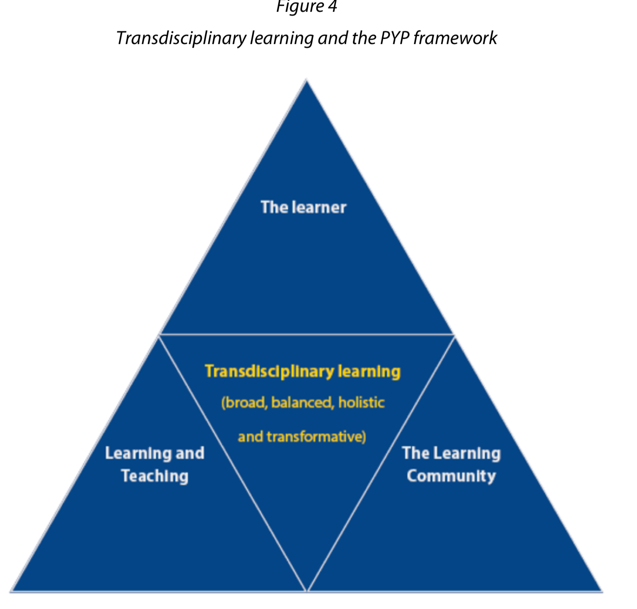
- The learner:describes the outcomes for individual students and the outcomes they seek for themselves (what is learning?)
- Learning and teaching:articulates the distinctive features of learning and teaching (how best to support learners?)
- The learning community:emphasizes the importance of the social outcomes of learning and the role that IB communities play in achieving these outcomes (who facilitates learning and teaching?)
The framework serves as a curriculum organizer and provides a step-by-step approach to achieving authentic conceptual inquiry-based learning for PYP students that is engaging, meaningful, challenging, and relevant. The framework necessity of nurturing an individual’s self-efficacy so students that have a high sense of self-efficacy to be engaged in their own learning and take action in their classroom.
sumber: https://www.ibo.org/programmes/primary-years-programme/
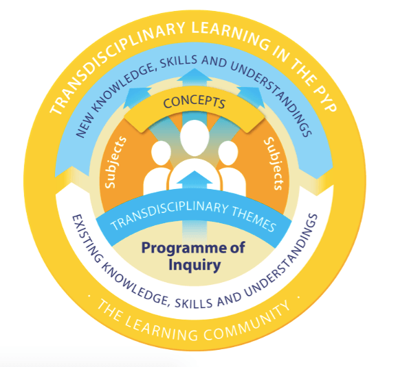
HOW THE PYP WORKS
The Primary Years Programme (PYP) is a transdisciplinary curriculum framework that offers authentic learning experiences. The PYP encourages students to learn to appreciate knowledge, conceptual understandings, skills and personal attributes as a connected whole.
THE WRITTEN CURRICULUM
We collaboratively develop a Programme of Inquiry (PoI) to reflect the unique aspects of our school’s community that is organized and framed by six transdisciplinary themes:
These transdisciplinary themes together provide our students with authentic learning experiences that are not confined to the boundaries of traditional subjects. Although subjects play an important role in learning
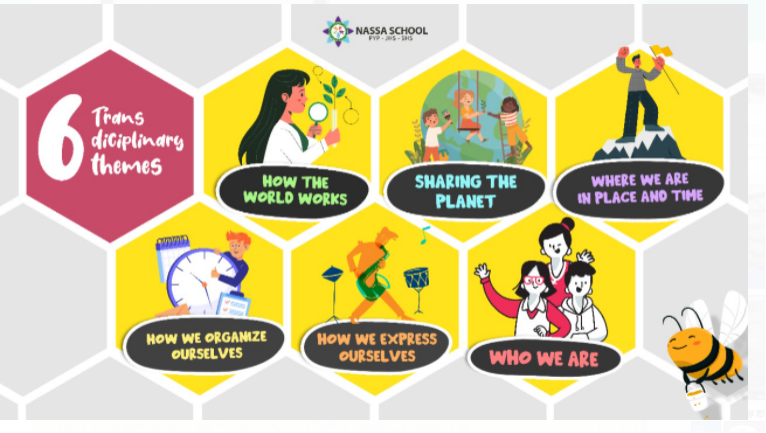
These transdisciplinary themes together provide our students with authentic learning experiences that are not confined to the boundaries of traditional subjects. Although subjects play an important role in learning
THE TAUGHT CURRICULUM
Inquiry learning is the core methodology used in PYP schools. The taught curriculum considers what is significant, relevant and engaging for the students. In the PYP it is believed that students learn best when they are actively engaged in their own learning by investigating issues after formulating their own questions and then proceeding with research, experimentation, observation and analysis that will help them to find solutions. This does not mean that the skills of literacy and numeracy are not considered, as these are required to support ongoing inquiry, but these skills are developed within the context of the units of inquiry.
THE ASSESSED CURRICULUM
Assessment is an important part of our student’s development. It is embedded in each unit of inquiry to inform learning and teaching and provide opportunities for students to reflect on what they know, understand, and can do. The assessment is ongoing. The progress is reported to parents through:
3 Way Conference. In the first semester where students, parents and teachers sit together to plan individual goals and strategies for each child for the forthcoming year.
Written Report Card; at the end of each semester.
- Parents Teacher Conference; designed to give the parents information about the student’s progress development and needs after written report sent home.
- Student Led Conference;during the second semester where students share their learning and experiences with parents in the authentic setting of the classrooms and specialist areas.
- Portfolio Home Conference;at the end of each semester, where students reflect on their progress through work samples in the student portfolio.
THE IB LEARNER PROFILES
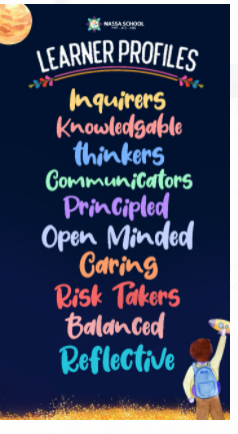
| Inquirers | They develop their natural curiosity. They acquire the skills necessary to conduct inquiry and research and show independence in learning. They actively enjoy learning and this love of learning will be sustained throughout their lives. |
| Knowledgeable | They explore concepts, ideas and issues that have local and global significance. In so doing, they acquire in-depth knowledge and develop understanding across a broad and balanced range of disciplines |
| Thinkers | They exercise initiative in applying thinking skills critically and creatively to recognize and approach complex problems, and make reasoned, ethical decisions. |
| Communicators | They understand and express ideas and information confidently and creatively in more than one language and in a variety of modes of communication. They work effectively and willingly in collaboration with others. |
| Principled | They act with integrity and honesty, with a strong sense of fairness, justice and respect for the dignity of the individual, groups and communities. They take responsibility for their own actions and the consequences that accompany them |
| Open-minded | They understand and appreciate their own cultures and personal histories, and are open to the perspectives, values and traditions of other individuals and communities. They are accustomed to seeking and evaluating a range of points of view, and are willing to grow from the experience |
| Caring | They show empathy, compassion and respect towards the needs and feelings of others. They have a personal commitment to service, and act to make a positive difference to the lives of others and to the environment. |
| Risk-takers | They approach unfamiliar situations and uncertainty with courage and forethought, and have the independence of spirit to explore new roles, ideas and strategies. They are brave and articulate in defending their beliefs. |
| Balanced | They understand the importance of intellectual, physical and emotional balance to achieve personal well-being for themselves and others. |
| Reflective | They give thoughtful consideration to their own learning and experience. They are able to assess and understand their strengths and limitations in order to support their learning and personal development |
For futher information about the IB and its programmes visit https://www.ibo.org
SCHOOL RULES AND REGULATION
All students are expected to read and learn the School Rules. Nassa school establish rules and regulations to guide acceptable behavior and ensure that the school environment is safe for students, teachers, and staff. School policies also help create a productive learning environment. The school’s approach towards discipline is for every student to be responsible conduct so as to contribute to the overall well-being of all in the school. Our rules and policies are designed to protect and staff and to optimize school performance which include:
· Nassa school profile
- Language policy – download(en) – unduh(id)
- Assessment policy – download(en) – unduh(id)
- Enrollment policy – download(en) – unduh(id)
- Inclusive policy – download(en) – unduh(id)
- Academic honesty policy – download(en) – unduh(id)
Language Policy
Assessment Policy
Enrollment Policy
Inclusive Policy
Academic Policy


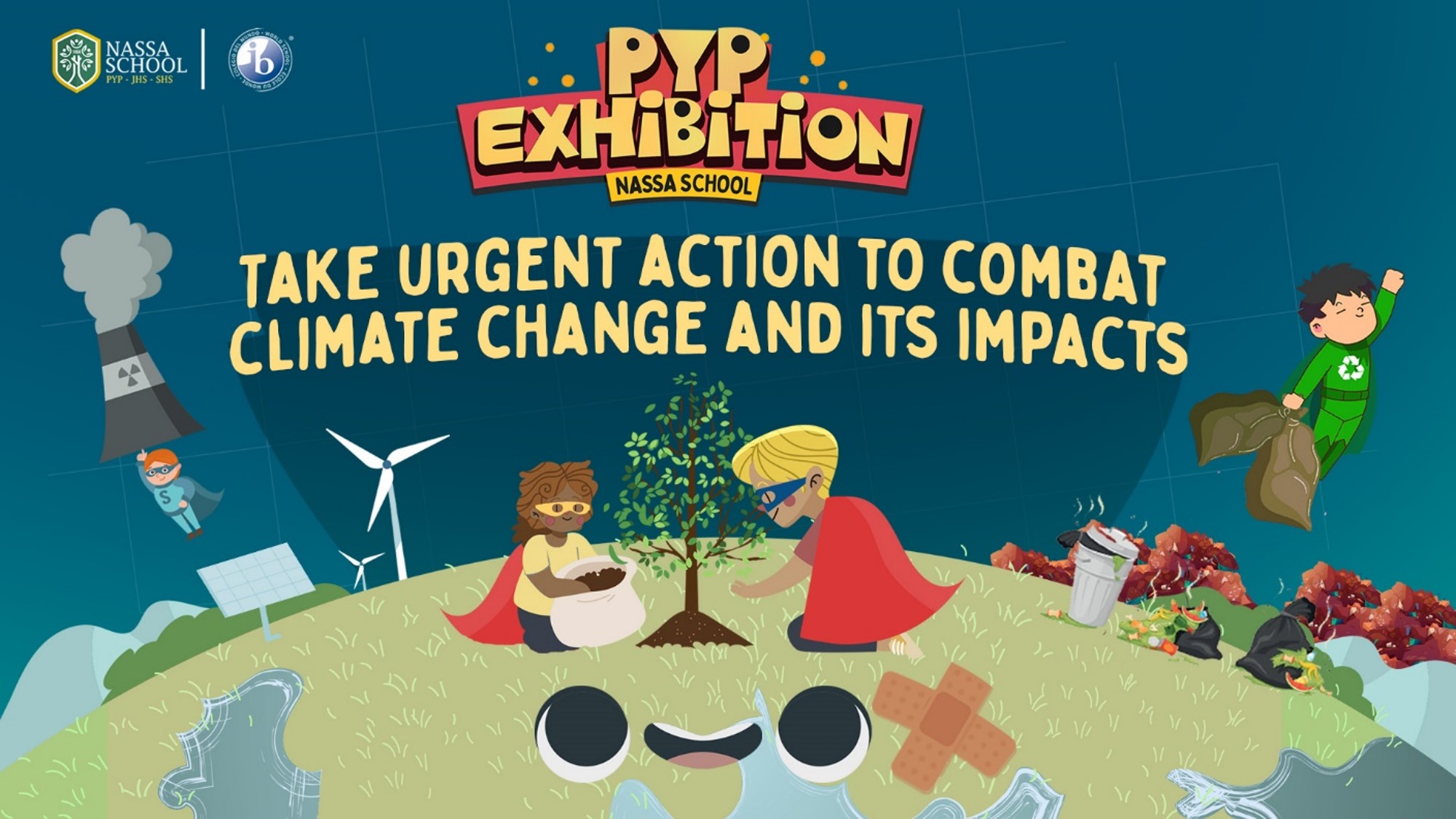
The PYP Exhibition aims to give students an experience in conducting research based on their interests, finding solutions for real-life problems from their perspective, and taking action based on their capacity. In this PYP Exhibition, students use their agency to choose the topic, initiate the action, and share their learning journey with the community. They are guided by mentors to exercise their skills as well as apply concepts to their chosen topic. Along with skills and concepts, students also practice how to present their profile.Our main focus in the PYP Exhibition 2024 is inspired by SDG number 13: To take urgent action to combat climate change and its impacts. We have discovered 10 topics: Clean Energy and Technology, Waste Management Practices, Plastic Reduction and Circular Economy, Greenhouse Emissions, People and Environment, Climate Action, Global Agriculture, Marine Ecosystem, Habitat and Biodiversity and Our Land and Resources.
2024


At Nassa School, we are committed to creating a world-class educational environment through the International Baccalaureate Middle Years Programme (IB MYP). Designed for students aged 11 to 16 (grades 7 to 10), the MYP empowers learners to connect their studies with real-world experiences, fostering both academic and personal skills essential for success in life. By establishing a strong academic foundation, the MYP enhances students’ confidence in managing their learning and making meaningful connections between classroom knowledge and the world around them.
Nassa School is a Candidate School for the IB Middle Years Programme (MYP). Our school is pursuing authorization as an IB World School. These are schools that share a common philosophy—a commitment to high-quality, challenging, international education that Nassa School believes is important for our students.*
*Only schools authorized by the IB Organization can offer any of its four academic programmes: the Primary Years Programme (PYP), the Middle Years Programme (MYP), the Diploma Programme, or the Career-related Programme (CP). Candidate status gives no guarantee that authorization will be granted. For further information about the IB and its programmes, visit ibo.org.
What is the IB MYP?
The IB MYP is a globally recognized framework that emphasizes holistic education, critical thinking, and intercultural understanding. This program equips students with the skills needed to navigate a rapidly changing world, preparing them to become informed and engaged citizens.
Our curriculum is designed to promote inquiry-based learning, where students are encouraged to ask questions, seek solutions, and develop a lifelong passion for learning. Through a balance of academic rigor and personal development, the MYP nurtures students’ intellectual, social, and emotional growth.
Video
Curriculum Highlights:
The IB MYP curriculum at Nassa School is both interdisciplinary and integrative, promoting connections between subjects and real-world applications. Our curriculum spans eight subject groups and six global contexts, ensuring a well-rounded and balanced education:
Language and Literature: Developing language skills and literary analysis (Bahasa Indonesia).
Language Acquisition: Learning additional languages for enhanced communication and intercultural understanding (English and Japanese).
Individuals and Societies: Exploring economic, historical, and geography, and Interdisciplinary, including Indonesian civics and religions.
Sciences: Encouraging scientific inquiry and experimentation (Physics, Biology, Chemistry, Interdisciplinary).
Mathematics: Building mathematical understanding and problem-solving abilities (Standard and Extended).
Arts: Fostering creativity through visual and performing arts (Visual-Media Arts, Theater, and Music).
Physical and Health Education: Promoting physical fitness and well-being.
Design: Encouraging innovation and practical problem-solving (Product and Digital Design).
Teaching and learning in context
Students learn best when their learning experiences have context and are connected to their lives and their experience of the world that they have experienced.
Using global contexts, MYP students develop an understanding of their common humanity and shared guardianship of the planet through developmentally appropriate explorations of:
identities and relationships
personal and cultural expression
orientations in space and time
scientific and technical innovation
fairness and development
globalization and sustainability.
Inclusion and Learning Diversity in MYP
As part of the MYP curriculum, schools address differentiation within the written, taught and assessed curriculum.
This is demonstrated in the unit planner and in the teaching environment, both of which are reviewed during programme authorization and evaluation.
The MYP allows schools to continue to meet state, provincial or national legal requirements for students with access needs. Schools must develop an inclusion/special educational needs (SEN) policy that explains assessment access arrangements, classroom accommodations and curriculum modifications that meet individual student learning needs.
STEM education in the MYP
The MYP is designed to facilitate interdisciplinary learning and teaching. The structure of the programme offers a variety of opportunities for students to make connections between and among traditional academic disciplines, including STEM subjects.
STEM-based learning can be structured through MYP personal and community projects as well as through both formal and informal interdisciplinary learning experiences in many MYP subject groups.
How can I learn more about the IB and MYP?
Visit the IB website at www.ibo.org or The IB MYP
Attend school meetings and events.
Speak with your school’s MYP coordinator.
